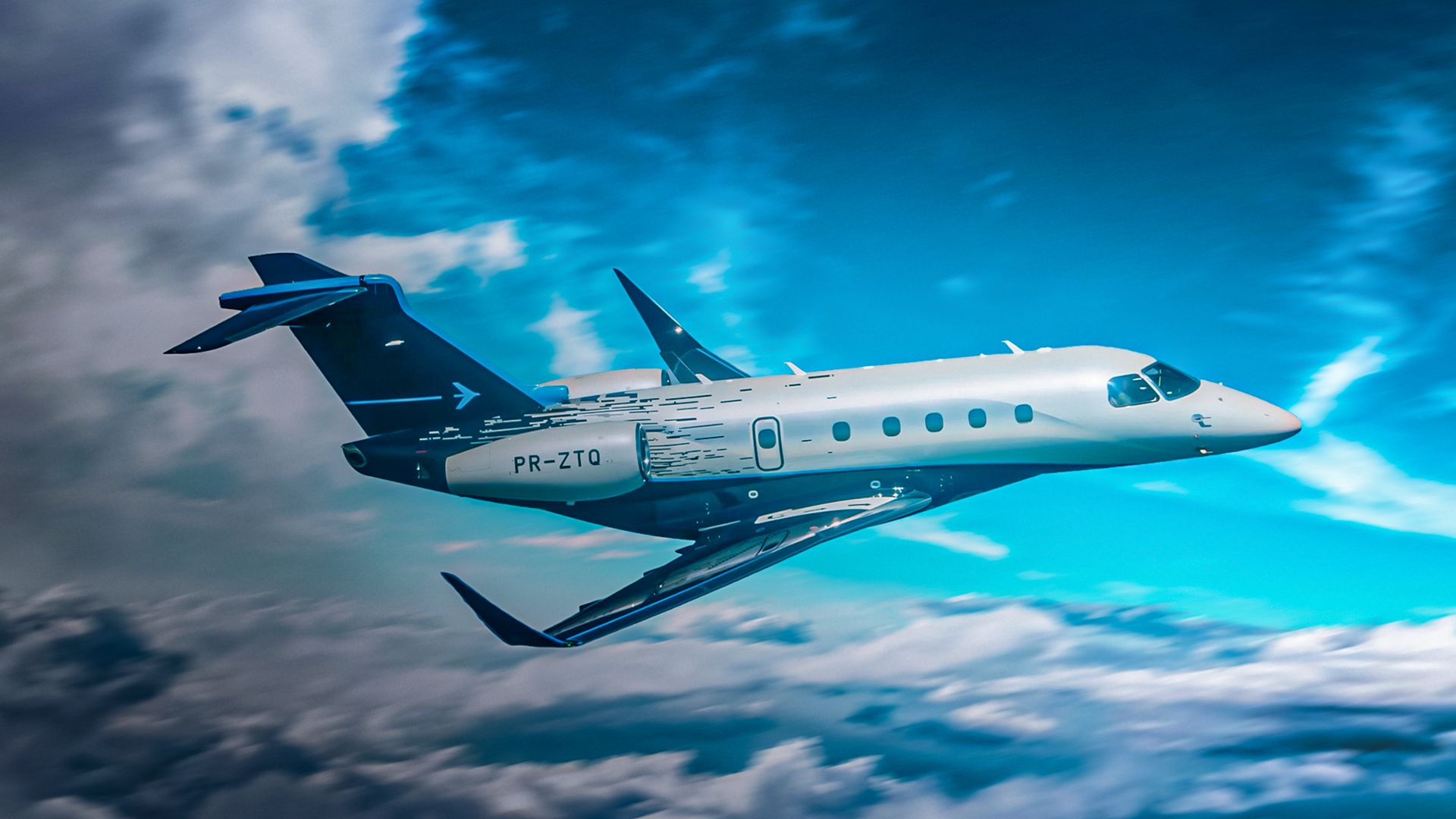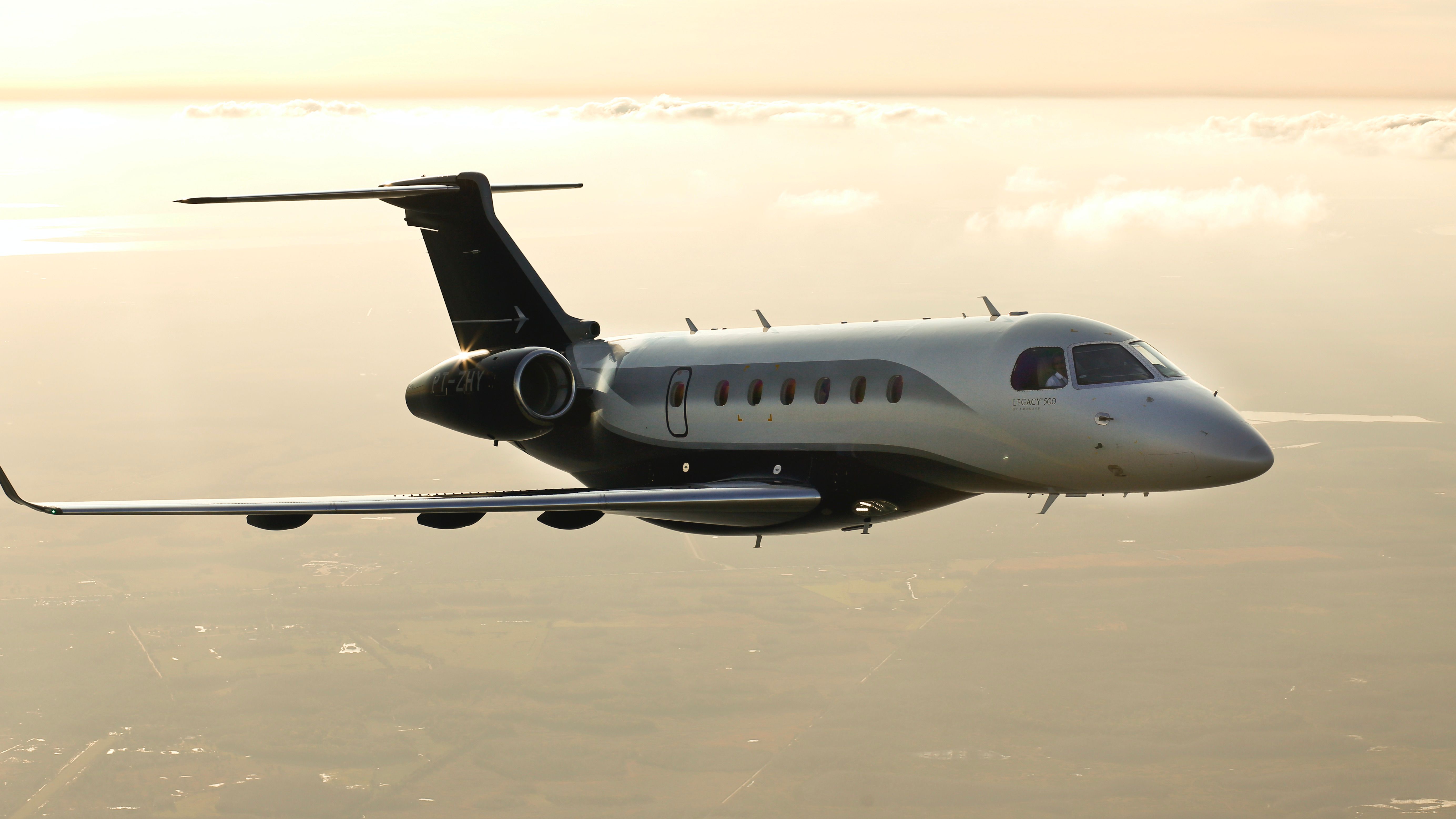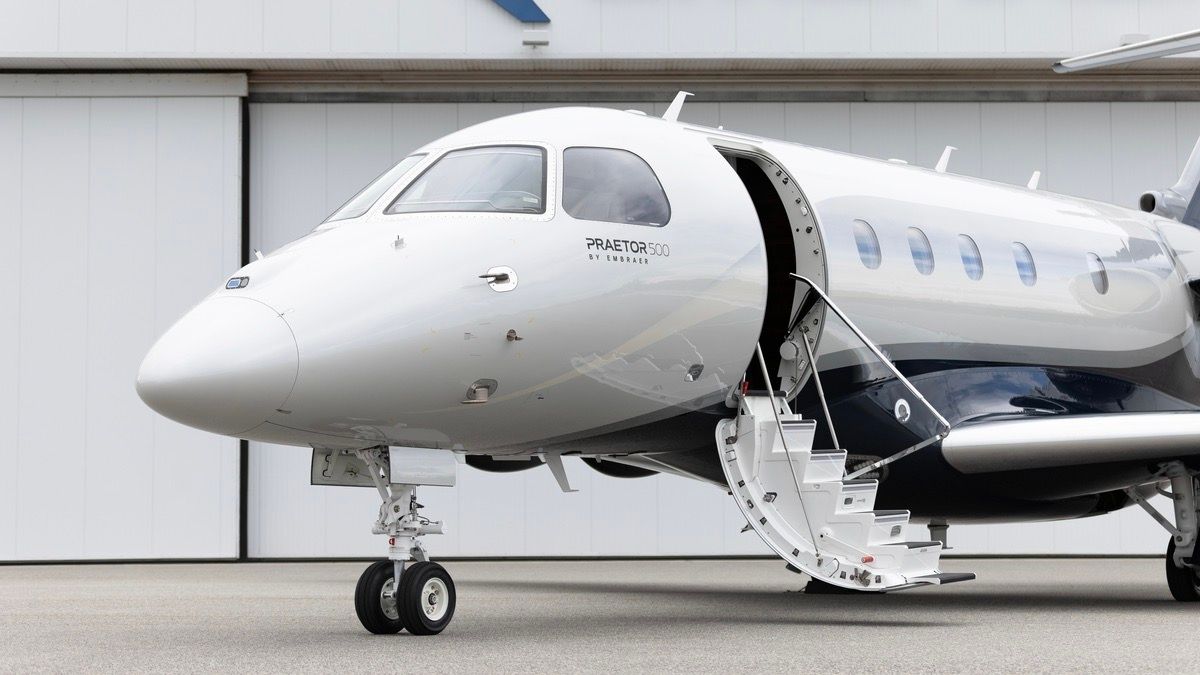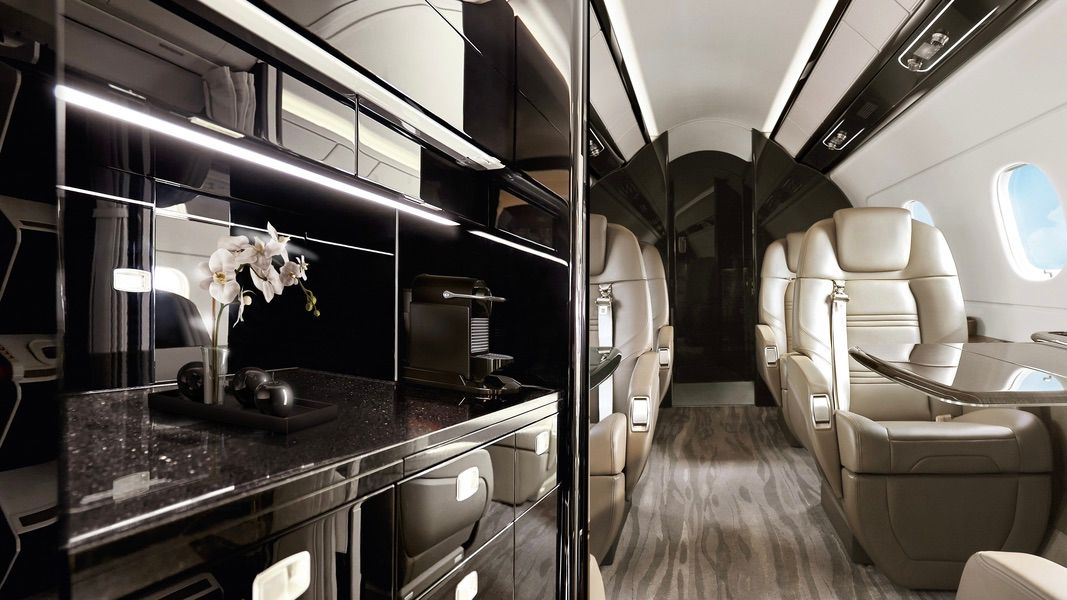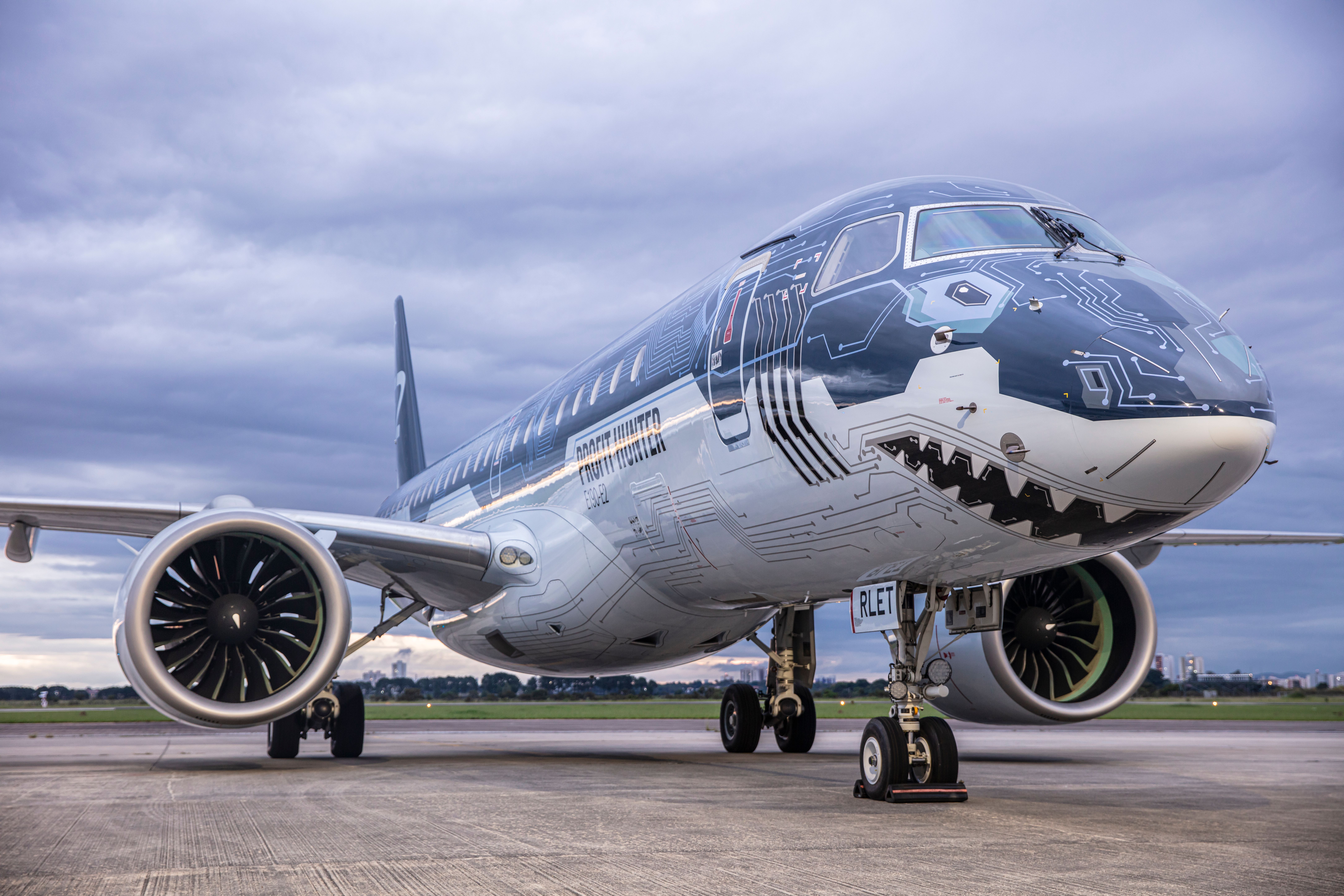Summary
- The Legacy 450 & 500 were introduced by Embraer with Honeywell engines and impressive technology.
- The Praetor 500 and 600 were updated versions of the Legacy and they are all in the same family.
- Embraer invested $750 million in the Praetor 500 and Praetor 600, with enhanced range compared to predecessors.
The Brazilian aircraft manufacturer Embraer originally introduced the Legacy 500 and 450 in April 2008. It was one of the first mid-size jets to have a flat floor stand-up cabin and fly-by-wire technology. So how did this develop into the Praetor 500?
Legacy 500 background
The first aircraft in this family to be produced was the Legacy 500, which was certified in August 2014. It has a range of 3,125 nautical miles or 5,790 kilometers and can seat up to 12 passengers. The aircraft has Honeywell HTF7500E turbofan engines and comes at a cost of $18.4 million. The cockpit features the Rockwell Collins Pro Line Fusion avionics suite and the Parker Hannifin fly-by-wire flight control system. The Legacy 500 first flew in July 2017.
Photo: Embraer
Legacy 450 introduced
The Legacy 450 was certified in August 2015. It is a smaller version of the Legacy 500 which can seat eight passengers and has a range of 2,900 nautical miles or 5,370 kilometers. It used the same engines and cockpit technology of the Legacy 500. The asking price of the Legacy 450 was $15.25 million and the first aircraft was delivered in December 2016.
Large investment
Embraer then announced variants of the 450 and 500 at the National Business Aviation Association (NBAA) convention in October 2018. These would become the updated version of the aircraft, the Praetor 500 and 600 and they invested $750 million into the project. All four aircraft in this family compete with similar aircraft in the mid-sized and super mid-sized categories, such as the Cessna Citation Sovereign, the Gulfstream 280 and the Bombardier Challenger 350.
Photo: Embraer
The Praetor 500 and 600
The Praetor 500 and 600 have taller and wider winglets than the Legacy 500. They have the same Honeywell HTF7500E engines as the Legacy, which create 6,540 pounds of thrust in the Praetor 500 and 7,528 pounds of thrust in the Praetor 600. Both aircraft have a longer range than their predecessors. The Praetor 500 has a range of 3,340 nautical miles or 6,190 kilometers. The Praetor 600 has a longer range of 4,018 nautical miles or 7,440 kilometers.
In more detail
The Praetor 500 is a low-wing, T-tail aircraft with a retractable landing gear. It has two rear-mounted turbofan engines and a pressurized cabin that seats up to nine passengers. There is a glass cockpit with multi-functional displays and side sticks. The cabin has a flat floor and a stand-up cabin of 6 feet tall. HEPA filters ensure that the cabin air is clean and clear from bacteria. The cabin altitude is one of the lowest in its class. There is a galley for producing food and a lavatory.
The Praetor 500 matches the fuel capacity of the previous Legacy 500 to 13,058 pounds. The aircraft was certified in August 2019 and it cost $18.995 million. Embraer describes the Praetor 500 as ‘disruptive’ and the most technologically advanced mid-sized jet. It is the fastest aircraft in its class and can fly non-stop from Dubai to Bangkok. As of April 2023, 62 Praetor 500 have been built and delivered.
Photo: Embraer
At a glance
Here is a comparison of the four aircraft in the same family and derived from one another:
|
Model |
Legacy 450 |
Praetor 500 |
Legacy 500 |
Praetor 600 |
|---|---|---|---|---|
|
Cockpit crew |
Two |
|||
|
Capacity |
7–9 passengers |
8–12 passengers |
||
|
Baggage capacity |
4.2 m3 (150 cu ft) |
4.4 m3 (155 cu ft) |
||
|
Length |
19.69 m (64 ft 7 in) |
20.74 m (68 ft 1 in) |
||
|
Height |
6.43 m (21 ft 1 in) |
6.44 m (21 ft 2 in) |
||
|
Wingspan |
19.25 m (63 ft 2 in) |
21.50 m (70 ft 6 in) |
19.25 m (63 ft 2 in) |
21.50 m (70 ft 6 in) |
|
Wing area |
44.85 m2 (482.8 sq ft) |
|||
|
Basic operating weight |
10,425 kg (22,983 lb) |
10,391 kg (22,908 lb) |
10,750 kg (23,700 lb) |
11,503 kg (25,360 lb) |
|
Maximum payload |
1,325 kg (2,921 lb) |
1,300 kg (2,900 lb) |
1,500 kg (3,300 lb) |
|
|
MTOW |
16,220 kg (35,759 lb) |
17,040 kg (37,567 lb) |
17,400 kg (38,360 lb) |
19,440 kg (42,858 lb) |
|
Fuel capacity |
4,962 kg (10,939 lb) |
5,920 kg (13,050 lb) |
7,320 kg (16,140 lb) |
|
|
Cabin altitude |
1,829 m (6,000 ft) |
1,768 m (5,800 ft) |
1,829 m (6,000 ft) |
1,768 m (5,800 ft) |
|
Cabin height × width |
1.83 m (6 ft) × 2.08 m (6 ft 10 in) |
|||
|
Cabin length |
7 m (24 ft) |
8.18 m (26 ft 10 in) |
||
|
Turbofan (×2) |
Honeywell HTF7500E |
|||
|
Thrust (ISA + 18°C) (2×) |
29.09 kN (6,540 lbf) |
31.30 kN (7,036 lbf) |
33.49 kN (7,528 lbf) |
|
|
Max. speed |
Mach 0.83 |
|||
|
High cruise speed |
856 km/h (462 kn; 532 mph) |
863 km/h (466 kn; 536 mph) |
||
|
Range† |
2,900 nmi (5,400 km; 3,300 mi) |
3,340 nmi (6,190 km; 3,840 mi) |
3,125 nmi (5,788 km; 3,596 mi) |
4,018 nmi (7,441 km; 4,624 mi) |
|
Ceiling |
13,716 m (45,000 ft) |
|||
|
Time to climb |
13,000 m (43,000 ft) in 21 min |
13,000 m (43,000 ft) in 22 min |
||
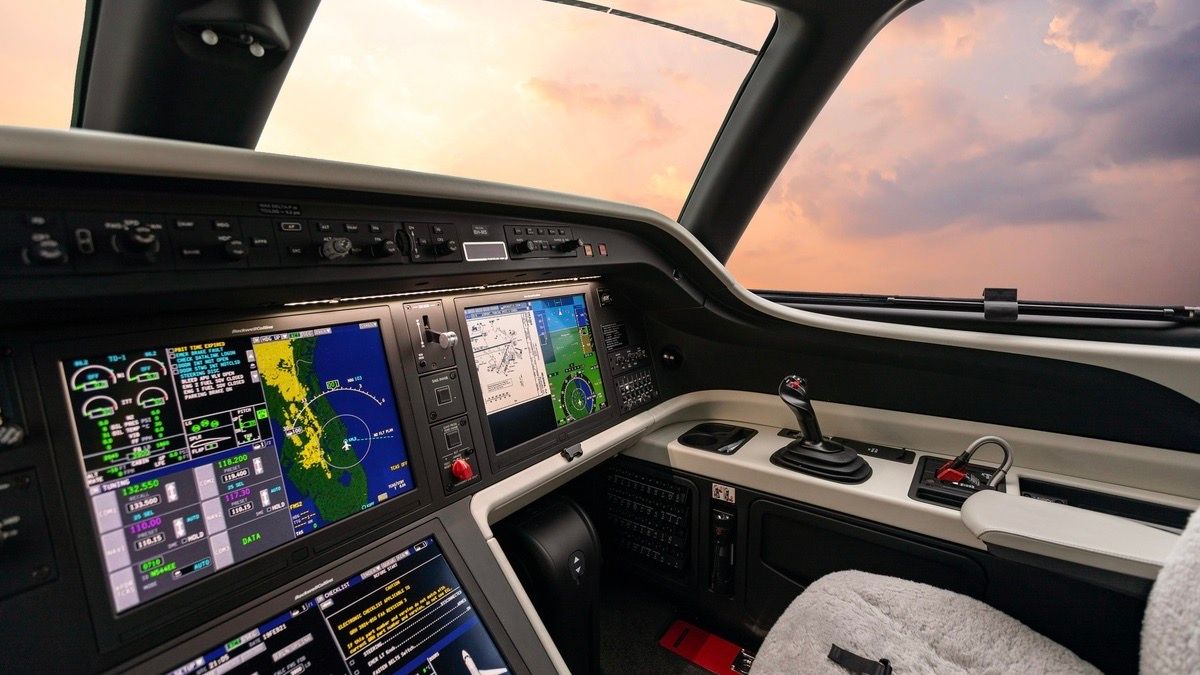 Avionics and the cockpit
Avionics and the cockpit
The Synthetic Vision System (SVS) has a flight guidance system for CAT I airport approach which allows auto-pilot flown instrument approaches down to 150 feet height and 1,300 feet runway visual range (RVR). There is an optional Enhanced Flight Vision System (EFVS) using the Rockwell Collins HGS-3500 Head-Up Display (HUD) and EVS-3000 infrared camera.
Differences between the Legacy 500 and 600
The Praetor 600, based on the Legacy 500, has two fuel tanks on the belly of the fuselage with a capacity for 15,986 pounds of fuel. It can seat up to 12 passengers and uses the same engines and avionics of the Praetor 500. The aircraft was certified in April 2019 and deliveries started in June 2019. The cost of the Praetor 600 is $21.95 million.

